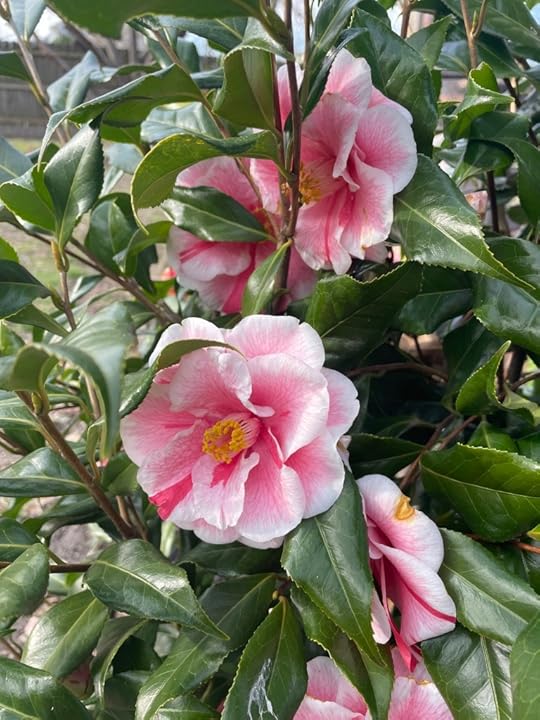Chasing Evils and Breaking Curses
Spring: A Time for Rebirth and Rituals in Bulgarian Folklore
Spring is a season of rebirth, when nature awakens from its long winter slumber and bursts into life with color and energy. In Bulgaria, this season is not just a shift in the weather; it’s a time deeply embedded in culture, folklore, and rituals. Each day brings with it the opportunity to connect with nature and celebrate the renewal of life.
When March comes, I know that spring is on its way and the light in our lives will return. In this transforming time, we need positive energy to embrace the change. The season gives us new hope and energy, and we dust ourselves off and feel more energetic and ready to achieve our goals.
I love to work in the yard, relaxing and thinking of new ideas for our books or creating new paintings. I haven’t painted so far this year because we are busy with our new book series.

Flowers from my garden
Baba Marta DayOne of the first symbols of this seasonal shift occurs on March 1, when Bulgarians celebrate Baba Marta Day. On this day, people wear a martenitsa, a red-and-white amulet, symbolizing the return of spring and the melting of snow. It’s not only a mark of the changing season but also a symbol of health, prosperity, and friendship.
I love to make martentsi each year, not only for my family and friends but also for our pets.

My daughter’s labradoodle, Ronnie, with a homemade Pijo & Penda martenitsa. He also makes an appearance in book 1 of our new series.
A Bulgarian martenitsa is exchanged as an amulet between friends a loved ones, a gesture of goodwill, wishing the wearer happiness and strength for the year ahead. As snow melts and flowers begin to bloom, so does the spirit of camaraderie and renewal among the people. I love to wear the charm as a bracelet, but there are many designs. We have some ideas and projects included in our book Light Love Rituals: Bulgarian Myths, Legends and Folklore if you want to learn more. Also people use martenitsi to predict their future.
International Women’s DayAlso we have one very important day: March 8.
In Europe this is the equivalent of Mother’s Day. In Italy they wear yellow mimosas, while in Bulgaria I gave my mom snowdrops or roses and a homemade card. It was special day to celebrate not only mothers but womanhood.
This is why March 8 is another significant date in the Bulgarian calendar, International Women’s Day. On this day social media is covered with virtual roses. It is a day to honor women, those who tirelessly nurture their families and contribute to society. While the world recognizes this day for women’s rights and achievements, in Bulgarian culture, it’s a moment to appreciate the often-overlooked work of mothers, wives, daughters, and women who have been the pillars of family and community life for centuries.
In Bulgaria, as in other countries in Europe, the woman, the mother, is the main column of the family. Women’s roles in Bulgarian society have evolved through time, but this day serves as a reminder of their resilience and invaluable contributions to the world. They have similar lifestyles like in the States; they have equal rights.

Flowers from my garden
Blagovets (Annunciation)Then, on March 25, Bulgarians observe Blagovets (Blagoverz), a day dedicated to clearing away bad spirits and ensuring prosperity. I use this day to declutter, use incense to clean the house, clean the yard and chase away snakes. I don’t like lizards and snakes, but my cat, Scarlet, is my gardener, she keeps me safe.
In Bulgaria, people take this day to purify their homes, gardens, and fields, praying for abundance in the year ahead. It is also believed to be the day when the mystical Samodivi—spirits of the forest—return from the wilds to interact with the human world.
Samodivi are complex beings in Bulgarian folklore. In the legends and village lore, they are often depicted as beautiful and powerful female spirits, wearing white robes and riding deer. They are protectors of nature, sometimes regarded as benevolent figures who guard the forests and the land. They are shapeshifters who can turn into a bird or wolf or a rainbow.
Unfortunately, in some villages, they are seen as demons, dangerous creatures—witches and soul takers, capable of luring men to their doom. These spirits are sometimes thought to possess supernatural powers, controlling the elements and the natural world around them.
The Samodivi’s mystique and controversy have made them enduring symbols in folklore, capturing the imagination of many. You may recognize their essence in various fantasy works, including Harry Potter, where similar creatures appear (called Veelas).
The Cursed Ring SeriesThe Samodivi’s influence is felt even today, especially in modern interpretations of folklore. In our new urban fantasy book series, The Cursed Ring, the Samodivi are brought into a new light through the character of Kalyna, a brave Samodiva who fights to protect humanity. She is a good nymph, but don’t make her angry. She can chase you down on her fast red motorcycle or as beautiful bird and make you pay for your actions.
Kalyna is not just any Samodiva—she is a tough agent, wielding her magical whip-snake, controlling the elements, and skilled in the art of combat. Her mission is clear: to fight for love, freedom, and to protect her kind, even if that means facing dark forces. Kalyna’s story is one of strength, determination, and the battle between good and evil, exploring the complexities of love and power in a world full of magic. She is the embodiment of the strong women who have long been a central part of Bulgarian folklore, using her ancient powers to fight for what is right.
In The Cursed Ring series, readers will dive deep into a world where the mystical Samodivi roam and where magic, adventure, and danger intertwine. Through Kalyna’s journey, we see how folklore can inspire and shape the modern world, with strong female characters who protect their people and their values against all odds.
In conclusion, spring in Bulgaria is more than just a change of season—it’s a celebration of life, nature, and the powerful forces that shape the world. From the martenitsa worn on March 1 to the honoring of women on March 8 and the ancient traditions surrounding Blagovets and the Samodivi on March 25, these rituals are reminders of the deep connections Bulgarians have to their land and their heritage. The arrival of spring marks a time to embrace rebirth, purity, and the strength of the spirit, and in the world of The Cursed Ring, we continue to draw inspiration from these powerful traditions.
Follow our Kickstarter to get updated about this new series when the campaign goes live. We’ll be revealing cover 2 soon…
And you can always find out what we are up to on our website.
I’d also like to recommend another Kickstarter campaign that’s running until March 27: The Crystal Heir by Brendan Noble. I’ve had the pleasure of being a beta reader for this series, and I’m hooked! You won’t want to miss it.
Happy Spring from Nelly and Rebecca – the power of two!




